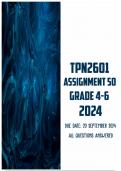, PLEASE USE THIS DOCUMENT AS A GUIDE TO ANSWER YOUR ASSIGNMENT
Please note that the author of this document will not responsibility for any plagiarizing you
commit.
An African Philosophy of Education
1. Decolonisation (Education) - Own understanding of the concept and examples of
implementation and teaching practice.
Decolonisation in education refers to the process of challenging and transforming the existing
Western-centric educational philosophies, methods, and content to include and prioritize indigenous
knowledge systems, perspectives, and pedagogies. This process aims to make education more
relevant, inclusive, and reflective of the diverse cultural contexts, particularly in post-colonial
societies like South Africa.
Decolonisation involves actively rethinking and reshaping the curriculum, teaching methods, and
assessment practices to ensure that they do not perpetuate colonial biases or marginalize local
knowledge and cultural practices. It seeks to create a more balanced and equitable educational
experience that is responsive to the needs and realities of all learners, particularly those from
historically marginalized communities.
2. African Communalism - Own understanding of concept and examples of implementation and
teaching practice.
African communalism is a philosophical concept that emphasizes the significance of community and
interconnectedness in African life. It views individuals not as isolated entities but as part of a larger
collective where each person's identity and purpose are deeply rooted in their relationships with
others in the community. The idea, as articulated by Letseka (2000), suggests that a person's value
and existence are largely defined by their role and contribution to the well-being of the community.
The principles of African communalism stress the interdependence of individuals, highlighting that
human relationships are fundamental to personal and communal development. Moreover, the
knowledge and content imparted in education must be practical and beneficial, directly contributing
to the improvement of the community.
In my understanding, African communalism is about fostering a sense of unity and mutual
responsibility among individuals. It teaches that personal success is intertwined with the collective
success of the community, promoting values such as cooperation, empathy, and shared responsibility.
In a teaching practice context, this concept can be implemented by encouraging group work and
collaborative learning, where students work together to solve problems, reflecting the
interdependence valued in African communalism. Teachers can also incorporate community-based
projects into the curriculum, allowing students to apply their knowledge in ways that directly benefit
their communities. Additionally, fostering strong relationships between students and educators can
create a supportive learning environment that mirrors the communal support systems found in
African societies. Through these practices, education becomes a tool not just for individual
advancement but for the upliftment of the entire community.




